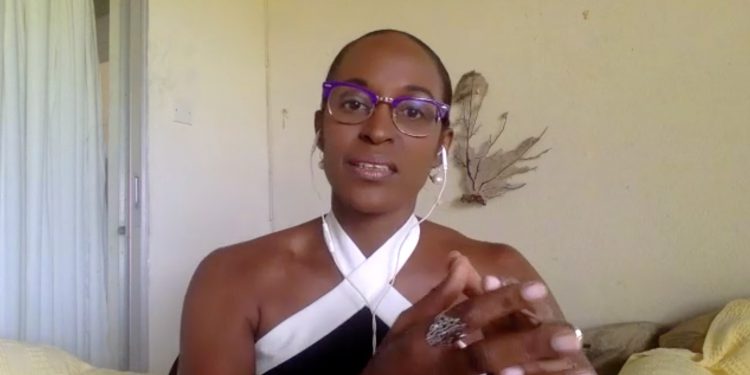Addressing the legacy of slavery is essential for improving food security in the Caribbean, says Stacey Alvarez de la Campa, founder of new consultancy Worldwide Sustainability Warriors.
In the meantime, she points out that ecocide is creating new burdens of inequity for young people.
“I’m in Barbados, an island, we’re isolated,” Stacey Alvarez de la Campa says. “Unfortunately, rather than focussing on the agricultural sector, we import 90 per cent of our food.
“In this region we have the socio-historical legacy of slavery and young people associating agriculture with some kind of bondage. It’s not seen as prestigious, like a doctor or a lawyer or an architect.”
It’s a theme that emerged during dialogues she convened ahead of the UN Food Systems Summit last year, and later underlined in her contribution at Cop26.
“Young people viewed agriculture as reminiscent of slavery and not financially viable”
Her Food Systems Summit dialogue found that, “Agriculture needs to be rebranded and re-imaged in order to combat the stigma that goes along with agriculture and agricultural activity.”
It found young people viewed agriculture as being for old men and reminiscent of slavery. It was boring and not financially viable.
“But we are being sorely impacted by supply chain nightmares arising from the Covid-19 pandemic,” Stacey Alvarez de la Campa explains. “And we’re seeing it again with the impact of the war in the Ukraine.
“Fuel prices are going through the roof, so the fuel used to transport our food is even more expensive. We’re seeing that reflected in food costs going up. We need to produce more locally.”
Worldwide Sustainability Warriors educates and prepares young people for the burdens they will inherit as a result of climate change, including food security.
“Ecocide will be recognised as a crime because of its impact on the next generation”
The consequences for failing children, otherwise, are extreme.
“The law is moving in a direction whereby the harm of current practices will be recognised as a crime because of the impact on the next generation,” she says.
Stacey Alvarez de la Campa holds a law degree and works as an anti-money laundering legal administrator by day. With her legal hat on, she is watching closely as campaigning to make ecocide a crime gains ground.
Campaigners are calling for environmental destruction to be tried in the International Court of Justice, alongside genocide, crimes against humanity, war crimes and crimes of aggression.
This would make it possible for individuals to be arrested over environmental damage. Instead, companies currently budget for law suits and fines, which hasn’t tempered bad practices.
“How can we invite young people into agriculture when climate change is wiping out farmers?”
She spoke at a roundtable, via video link, about inter-generational equity on Climate Law and Governance Day at Cop26.
“This movement is recognising the potential for harm to the younger generation,” she explains. “More young people want their voices heard through a legislative presence. The voices of young people need to become part of a pattern to change the world.
“How can we invite young people into agriculture when, thanks to climate change, any kind of extreme weather event sees crops being decimated, wiping out smallholder farmers who often don’t have the insurance that they need? It paints a grim picture.
“We need to create a better common market to make local agriculture viable. We have the Caricom common market but it’s not used enough for agriculture.
“We need to scale to export some of our indigenous fruits and vegetables, to brand them as a consistent presence in the market both locally and overseas.
“We should be offered sweet potato or cassava chips rather than just French fries”
“We need to improve links between smallholder farmers and hotel chains, so visitors are being introduced to local produce.
“And we need to normalise indigenous foods with children, so they expect to be offered sweet potato or cassava chips rather than just French fries. We should expect a choice so that local farmers producing that crop have an outlet.
“We need to break down assumptions and show everyone the relevance of food systems.
“It’s more than just going to a supermarket to buy something. It’s about your connection to land, your connection to nature. It’s a business you can flourish in.
“I’m eternally optimistic, Cop26 was a start. You saw Tuvalu’s foreign minister delivering his speech knee deep in water – that was so powerful.
“There was a strong small island presence. A sense of youth. It was called the most exclusionary Cop ever by some, but that made us more aware of the necessity of bringing all the voices together.
“I think Cop27 is going to build on the moral imperative that we have to do something.”
Stacey Alvarez de la Campa is joining the next virtual gathering of The EA Project (Events for Action) and its Circular Society Network, “Climate Justice and Unheard Voices” on March 24th. Registrations close on March 22nd.
These monthly events highlight circular and sustainable solutions, matching participants in intimate groups designed to accelerate achievement of the UN Sustainable Development Goals, while also unlocking new business opportunities.
Register using this link for a 50 per cent discount on tickets and special offers.
A second part to this event will take place in April to highlight OmniAction.























